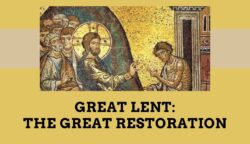Penance is the sacramental act through which we are reconciled with God when sin has severed our relationship with our Creator and with his Holy Church. The sacrament of penance takes us back to our baptism when we were cleansed of our sins and were received as children of God. In the Tradition of the Church penance is indeed considered a return to our baptism, when we were initiated into the fullness of life in communion with God.
There are three conditions that make penance a living and life-giving experience for the person seeking to reestablish full communion with God through his Son, our Lord Jesus Christ.
The first condition is repentance or contrition that is feeling sorrow for one’s own sins. Repentance must come from the depths of one’s heart, in a natural process of contrition. Without the true feeling of sorrow penance is more than a mere ritual formality, and indeed a hypocrisy.
The second condition is confession, an open and full acknowledgement of one’s sins. “Set forth your case, so that you may be proved right.” (Isaiah 43:26) To be worthy of the forgiveness of God one must confess one’s mistakes and errors sincerely and from the heart, with love and with faith. It is a grave sin indeed when one knowingly hides one’s sins and refuses to confess them.
The third condition of the sacrament of penance is the absolution through which the repentant receives God’s forgiveness through Christ and his designated successors on earth, his apostles and their successors, the priests.
The formal pronouncement of absolution in the Armenian Church contains the words of empowerment by Christ to his disciples: “Whatever you bind on earth will be bound in heaven, and whatever you loose on earth will be loosed in heaven.” (Matthew 16:19) The absolution may involve what is often called an act of penance as reparation for the sins committed. The act or acts of penance designated by the Church depends on the number and severity of the sins. The penitent must accept and fulfill the assigned acts of penance willingly and cheerfully, not as punishment but as a way of rebuilding one’s spiritual and moral life which was weakened by sin. Acts of penance may include a sustained period of increased prayer, fasting, clearly understood and focused sacrifices, defined works of charity, and in cases of very grave sins suspension from Holy Communion.













